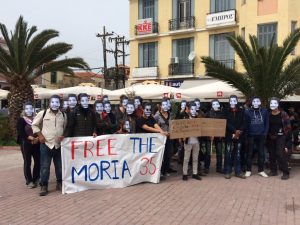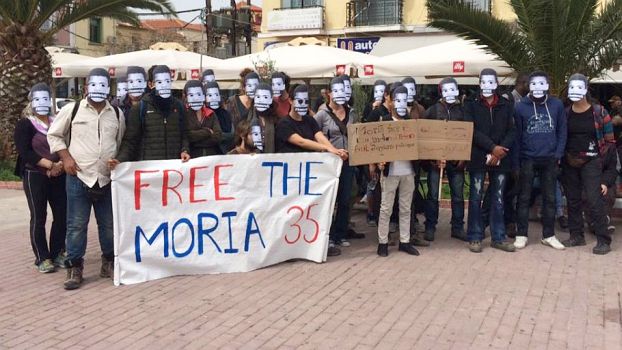On June 13th, two refugees from Ghana and Guinea have been deported to Turkey under questionable legal grounds. Despite the efforts of the Legal Centre Lesbos and lawyers from the organization HIAS, who were fighting against the deportation order, the two men were quietly deported one day before the weekly deportation day.
After their arrival in Turkey, they will be most likely deported back to their home countries where they will, according to their claims, face persecution and imprisonment under degrading conditions. This is not the only reason, why the deportations were legally highly questionable: on the one hand, the two men did not get the chance to exhaust their legal remedies in Greece and on the other hand, both men are important witnesses of a serious crime committed by the police connected to the “Moria 35” case.
The two deported men who were among the convicted Moria 35 have already spent ten months in prison. Together with 33 other men, they were arbitrarily and violently arrested during a violent police raid in Moria Camp, Lesvos Island, on Tuesday 18th July 2017.
One 10th May, activists and lawyers were able to prevent the deportation of seven men who were part of the Moria 35 group. However, one week later, the deportation of the two men could not be stopped – although the two deported men were, according to their lawyers, eligible for humanitarian protection. One of the deported individuals from Guinea expressed his desire to appeal the rejection of his asylum claim. He claims that he is a survivor of torture, and will be subject to persecution if returned to his country. Although lawyers from HIAS and the Legal Centre informed the police that they would file an appeal on the man’s behalf, the police deported him. This way, his legal right to appeal was swiftly denied.
The coordinator of the Legal Centre Lesbos, Lorraine Leete, explained about one of the deported individuals:
“His right to appeal was clearly denied, and his deportation was illegal as police were aware that he would be appealing the denial of his claim and they proceeded with the deportation in any case.”
See also Legal Centre Lesbos: June Report on Rights Violation and Resistance in Lesvos
The asylum case of the second individual from Ghana had been rejected at second instance and already in 2017, he had been scheduled for deportation, but he lodged a subsequent application. It was the denial of this subsequent application that led to his deportation. However, he had new evidence to prove that he will be imprisoned 10-15 years if returned to Ghana. Prison conditions in Ghana are according to human rights reports “generally harsh and sometimes life threatening due to physical abuse, food shortages, overcrowding, and inadequate sanitary conditions and medical care”. Therefore, the men is according to lawyers eligible for subsidiary protection, or even a refugee status. He still had the option of appealing the denial of his asylum claim in an administrative court, but less than two days after being informed that he could not file a subsequent application, he was deported to Turkey.
The asylum lawyer Lorraine Leete comments:
“The swift move of the police to deport these individuals show that while procedures to grant protection and ensure that refugee rights are respected are constantly delayed, the State is able to mobilize and act swiftly to deny these same rights.”
Film about the violent arrests and the conviction of the Moria 35


